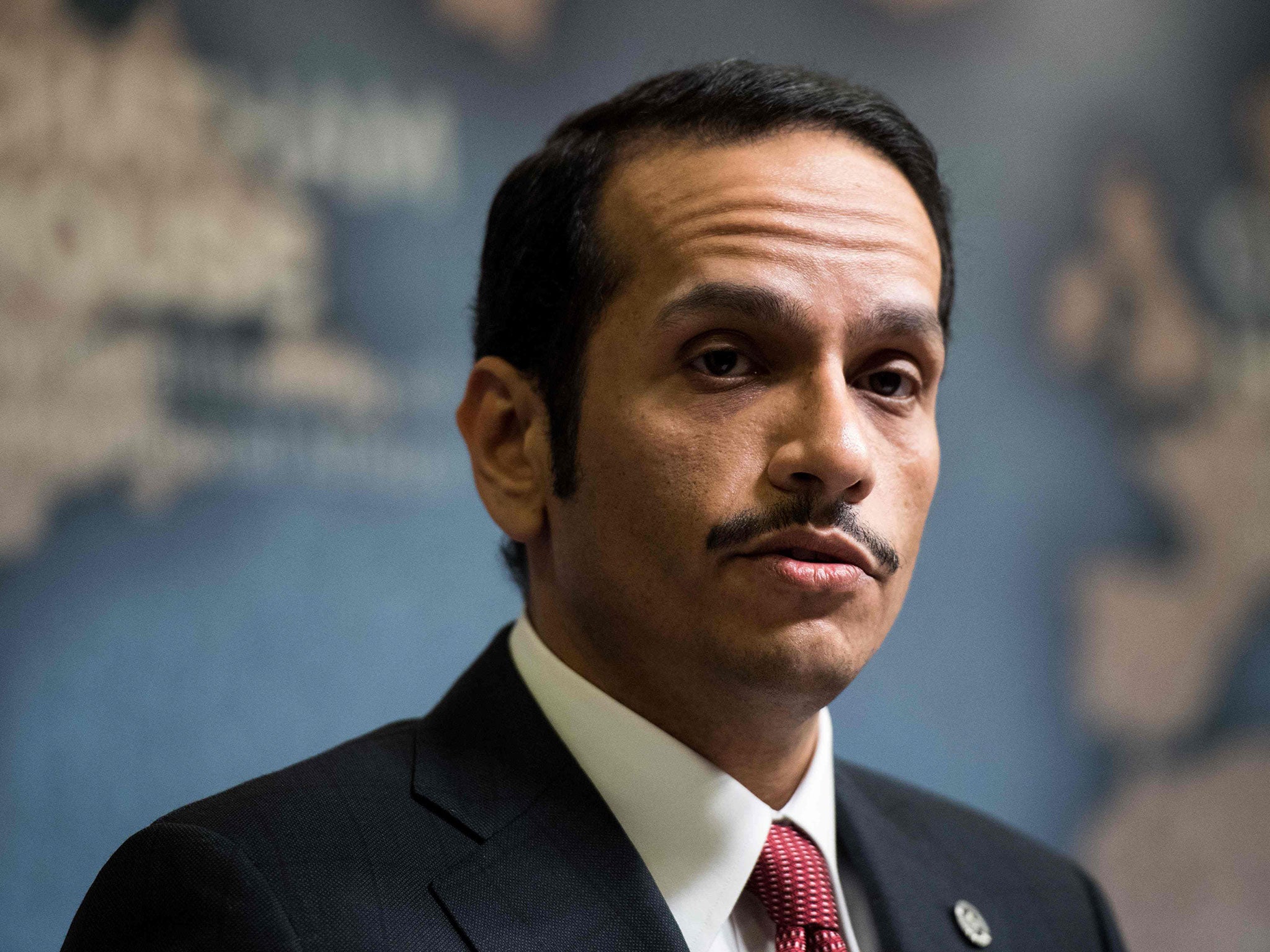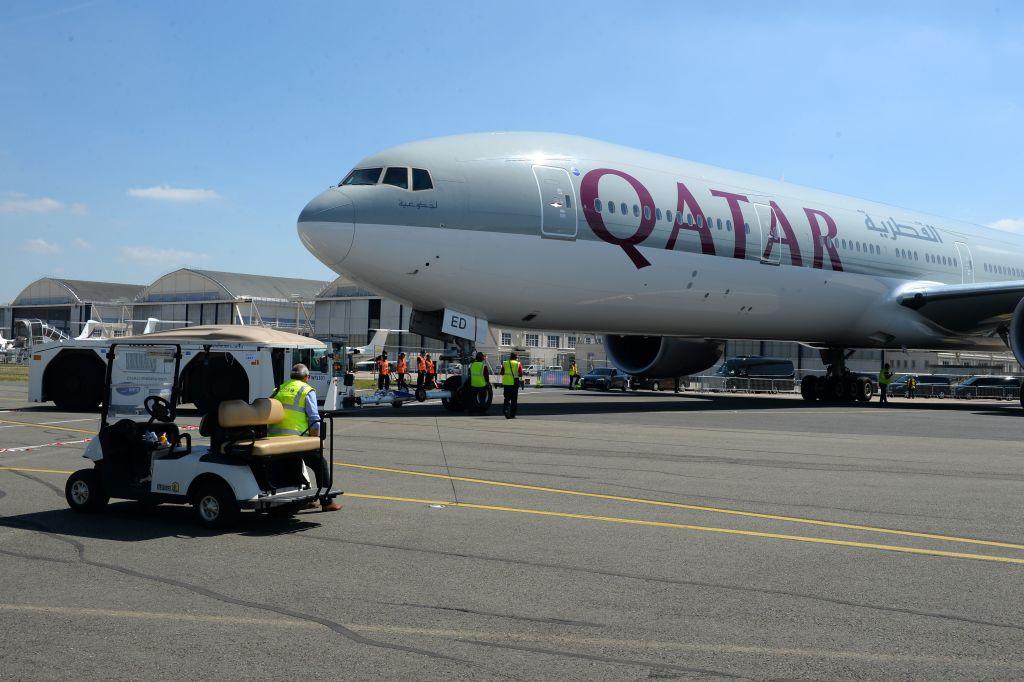Saudi Arabia is a 'bully' that risks destabilising Middle East, says Qatar
Exclusive: ‘This is a big country bullying a small country – we have seen it in Qatar and now we are seeing it repeated in Lebanon’

Your support helps us to tell the story
From reproductive rights to climate change to Big Tech, The Independent is on the ground when the story is developing. Whether it's investigating the financials of Elon Musk's pro-Trump PAC or producing our latest documentary, 'The A Word', which shines a light on the American women fighting for reproductive rights, we know how important it is to parse out the facts from the messaging.
At such a critical moment in US history, we need reporters on the ground. Your donation allows us to keep sending journalists to speak to both sides of the story.
The Independent is trusted by Americans across the entire political spectrum. And unlike many other quality news outlets, we choose not to lock Americans out of our reporting and analysis with paywalls. We believe quality journalism should be available to everyone, paid for by those who can afford it.
Your support makes all the difference.Lebanon is just the latest target in a Saudi campaign of intimidation that risks destabilising the Middle East, Qatar’s Deputy Prime Minister has claimed.
Mohammed bin Abdulrahman al-Thani, who also serves as the nation’s foreign minister, accused Riyadh of “bullying” its neighbours and risking new conflict amid an ongoing diplomatic crisis.
The minister repeated allegations made by Lebanese politicians that Saad Hariri’s shock resignation as Prime Minister was forced during his time in Riyadh, where some claimed he was kept under “house arrest” before making the announcement.
“Lebanon is a fragile country, and pressuring the Prime Minister to resign and leave a vacuum in a country – which is very sensitive for everybody – is a counter-productive policy,” Mr al-Thani said at a round table discussion including The Independent, at a conference in London.
“This is a big country bullying a small country – we have seen it in Qatar and now we are seeing it repeated in Lebanon.
“Thanks to God and all the allies that contained the situation before it evolved and got worse … If it was not contained from the beginning we would have a horrific impact.”
Mr Hariri left Saudi Arabia following intervention by Egypt and France, returning to Lebanon last week and postponing his resignation at the request of President Michel Aoun while a “dialogue” takes place.
Saudi leaders have denied holding Mr Hariri – a dual Saudi-Lebanese citizen - against his will and forcing him to resign, while claiming its sanctions against Qatar are justified.
Mr al-Thani’s comments came amid the continuing Qatar diplomatic crisis, which saw countries led by Saudi Arabia sever relations in June and accuse the government of supporting terrorism and violating cooperation agreements.
The dispute has seen ambassadors withdrawn, diplomats evacuated, Qatari broadcaster al-Jazeera banned and Qatar’s only land border, air and see routes blockaded in a move that sparked international alarm.
Qatar’s al-Udeid Air Base houses the regional headquarters for US Central Command and RAF, hosting 11,000 members of coalition forces and 100 aircraft launching air strikes against Isis in Iraq and Syria.
Mr al-Thani said that although emergency air corridors were open, planes were being forced to fly over Yemen and that military operations were being “put in jeopardy” by the blockade, which has closed the border used to import 90 per cent of supplies for Qatar.
He claimed a list of 13 demands issued by Saudi Arabia and its allies in exchange for lifting the restrictions were impossible to meet, and a “clear indication that they don’t want [the agreement] to be accepted.
“They don’t want to resolve this - they want our country in submission, which is the main reason they started the entire thing,” he added.
“This is just part of a pattern of impulsive leadership … They entered this conflict with no exit strategy.
“No one has identified a strategy; no one has any idea on the way forward with them.”

The Gulf Cooperation Council has temporarily collapsed under the strain of the crisis, with a scheduled meeting next month thrown into doubt.
The minister was also highly critical of Saudi Arabia’s involvement in the continuing Yemen war, which has developed into a humanitarian catastrophe amid sieges and air strikes, and raised concern that its continued proxy conflict with Iran could worsen.
“We hope that there will not be any confrontation,” Mr al-Thani said. “Yemen needs to end, Iraq needs to be stabilised, we need to reach a just solution for the Syrian people, otherwise we are going to face a new generation of extremism.
“There are enough crises on the table – we hope that no more will be created.”
Mr al-Thani told the Westminster Counter-Terrorism Conference that the Middle East – “a region brimming with extremism” - could not afford more turbulence, as conflict continues in Syria, Yemen, Iraq and Afghanistan.
“Although the Middle East was once a region of peace and co-existence, it has unfortunately been transformed into a region of turbulence and totalitarianism, where extremism flourishes,” he said.
“What is the root cause of terrorism? Tyranny, totalitarianism, aggression and the absence of justice.”
He said 24 million children across the Middle East were being left vulnerable to recruitment by terrorist groups, authoritarianism and a lack of education and opportunity, adding: “We need to address this issue of regimes who are not respecting the rights of their people or the law.”
Saudi Arabia has accused Qatar of funding terrorist groups and sheltering extremists, allegations repeated by Donald Trump in June. Qatar refutes them, saying it prosecutes jihadis where they are found and has merely facilitated talks involving Hezbollah and Hamas upon international request.
“There is absolutely not any link between Qatar, terrorism and terrorist movements,” Mr al-Thani said.
“They see the West as enemies, they see us as enemies … Other countries are accusing any political opponents of being terrorists.
“Some countries are just using terrorism as justification for political matters against Qatar - they see this is the only way they can get sympathy…wwe learnt from the blockade that we have to present our case very clearly and not to ignore any accusation which can be used against us.”
The Deputy Prime Minister said Qatar would not retaliate by cutting of gas supplies to the United Arab Emirates or other Saudi allies, because it “would not use the same approach they have used against our people”.
He called for allies including the UK to be more engaged in the region, after Boris Johnson travelled to Qatar and Kuwait in a bid to ease tensions.
The Foreign Secretary later welcomed the Emir of Qatar’s “commitment to combat terrorism in all its manifestations”, including financing.
“The Emir also pledged to resolve the remaining differences with Saudi Arabia, UAE, Egypt and Bahrain through dialogue, negotiation, and Kuwaiti mediation,” Mr Johnson said earlier this year.
“We hope that in turn Saudi Arabia, UAE, Egypt and Bahrain respond by taking steps towards lifting the embargo.
“The UK will continue to engage our partners in the region to help them reach a solution.”
Join our commenting forum
Join thought-provoking conversations, follow other Independent readers and see their replies
Comments